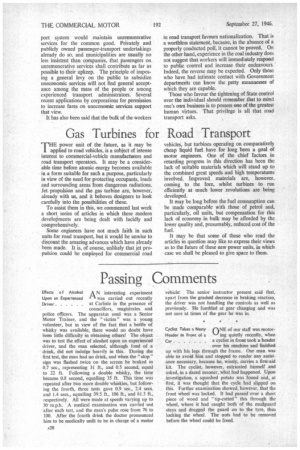Gas Turbines for Road Transport
Page 22

If you've noticed an error in this article please click here to report it so we can fix it.
THE power unit of the future, as it may be applied to road vehicles, is a subject of intense interest to commercial-vehicle manufacturers and road transport operators. It may be a considerable time before atomic energy becomes available in a form suitable for such a purpose. particularly in view of the need for protecting occupants, loads and surrounding areas from dangerous radiations. Jet propulsion and the gas turbine are, however, already with us, and it behoves designers to look carefully into the possibilities of these.
To assist them in this, we commenced last week a short series of articles in which these modern developments are being dealt with lucidly and comprehensively.
Some engineers have not much faith in such units for road transport, but it would be unwise to discount the amazing advances which have already been made. It is, of course, unlikely that jet propulsion could be employed for commercial road vehicles, but turbines operating on comparatively cheap liquid fuel have for long been a goal of motor engineers. One of the chief factors in retarding progress in this direction has been the lack of suitable materials which will stand up to the combined great speeds and high temperatures involved. Improved materials are, however. coming to the fore, whilst turbines to run efficiently at much lower revolutions are being developed.
It may be long before the fuel consumption can be made comparable with those of petrol and. particularly, oil units, but compensation for this lack of economy in bulk may be afforded by the lower quality and, presumably, reduced cost of the fuel.
It may be that some of those who read the articles in question may like to express their views as to the future of these new power units, in which case we shall be pleased to give space to them.




































































